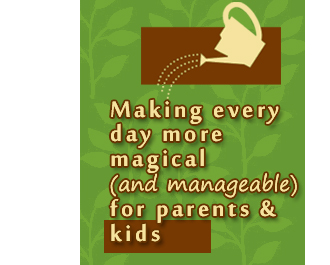In Part 1 of Helping Children Fail Successfully I talked a bit about success, failure and how to teach children to fail successfully. I proposed we change the term Fear of Failure to Fear of Learning Nothing From Failure. Today, we'll start on the sometimes tough work of thinking about how one reacts to failure and next week I'll provide some Quick Start Coaching Tips for teaching children to succeed at everything they attempt. How? To succeed in their endeavors, certainly, but also to get something positive from the times they fail. The way I see it it's a win-win, lose-win situation!
Quick Start Coaching Tip: This weekend it's all about you.
Who likes thinking about their failures? Well, it won't be forever (a great lesson to be learned from a failure!) and it's an important step in understanding how your methods of dealing in both positive and negative ways might impact the way you approach it with your children.
1. Can you remember a situation where you really wanted to succeed at something but didn't? (think back to last week or as far back as grade school)
Was it a job? A competition? A marathon? A game? A promotion? A personal goal you set but weren't able to achieve? A part in the school play? A date for prom? A grade you wanted on an exam? A course you wanted to take? That cute guy/girl you were just dying to go out with? The account you wanted to land?(I just came up with about a dozen myself!)
2. Write down the words that come to mind that describe how you felt.
Angry, sad, furious, enraged, depressed, dejected, ashamed, annoyed, blase, hysterical, whichever words work for you.
3. What did you do next?
Did you brood? Did you give up on the whole thing altogether? Did you try and figure out what you might have done differently? Did you blame yourself completely for the failure? Did you ask other people for support? Did you shut yourself away alone until you got over it? Did you abandon all hope for ever achieving the goal? Did you recharge and attempt it again? Did you try to achieve it a different way?
The list of ways one reacts is vast. Everyone has their own way of dealing with failure what we're trying to do here is identify your particular way of reacting so that you can think about how that impacts the way you react to the failure/s of the children in your life.
4. Would you react differently to it today? How?
Experience is a great teacher (I love her but I really wish she was always kind to me instead of teaching me some lessons the hard way!). Time often provides us with a new perspective on an old situation.
5. What did you learn about yourself and what's right for you by going through the situation?
Take a couple of days to think about it. Next week you'll use that personal knowledge to move forward with teaching the children in your life about failing, failing good, and how to learn from their failures and disappointments so that they can move forward successfully. That might sound like a contradiction but it really isn't.
Email me your war stories, tears, upsets and all. I love hearing from you.
To read Part 1 of the series click HERE
Enjoy the day your way,
Rebecca (Kiki)
Daily Life Consulting
~~~~~~~~~~~~~~~~~~~~~~~~~~~~~
For more information on coaching, groups, workshops, seminars or classes, lectures and materials for your group or organization please call 646.468.0608 or email me at kiki at dailylifeconsulting dot com
skip to main |
skip to sidebar

Add some magic to your day!

EDUCATION, COACHING and PARENTING TIPS and TOOLS FROM EDUCATION & PARENTING COACH REBECCA "KIKI" WEINGARTEN,M.Sc.Ed, MFA

Add some magic to your day!
About Me
- Rebecca "Kiki" Weingarten M.Sc.Ed, MFA
- New York, New York, United States
- Rebecca Kiki Weingarten M.Sc.Ed, MFA is a Govt./Web 1 & 2.0 executive turned Consultant/Coach & Developer/Trainer for Corporate,Career,Education,Healthcare, Transitions,Multi-industry programs/seminars and speaker, as well as personal coach. Co-Founder/President of NYC based DLCECC www.dlcecc.com she consults & coaches entities & individuals to enable them to attain their goals through coaching, workshops and seminars that she creates, leads and implements & her patented FIRST(sm) & OPTIONS(sm) systems. She recently completed a multi-year coaching program developed in association with targeted Barnes and Noble locations in the tri-state region. She has been a featured expert in national publications including Forbes,the LA Times,Pink,Chicago Sun Times,Dow Jones/Marketwatch,MSN,WebMD, Yahoo/HotJobs, ESPN and others.Weingarten's multi & interdisciplinary approach is a result of her own career transitions, professional experience, training & education in the fields of government, education, counseling, psychology and creative writing. (For more info visit dailylifeconsulting.com/kiki1.html) She loves assisting corporations and individuals in achieving their goals.
Daily Life Links
- Dictionary of Occupational Titles
- Wall Street Journal
- New York Times
- Business Week
- WebMD Kids Playing: Slingshots vs. Video Games - Rebecca Kiki Weingarten
- Encyclopedia Britannica - Are You Ready For Act 2? Rebecca Kiki Weingarten
- @coachkiki on Twitter
- DLCECC
- Kick Start Self Coaching
- http://www.rachel-w.com
- http://www.hellogorgeousguide.com
- www.careerandcorporatecool.com
- Aspiring to Ordinary